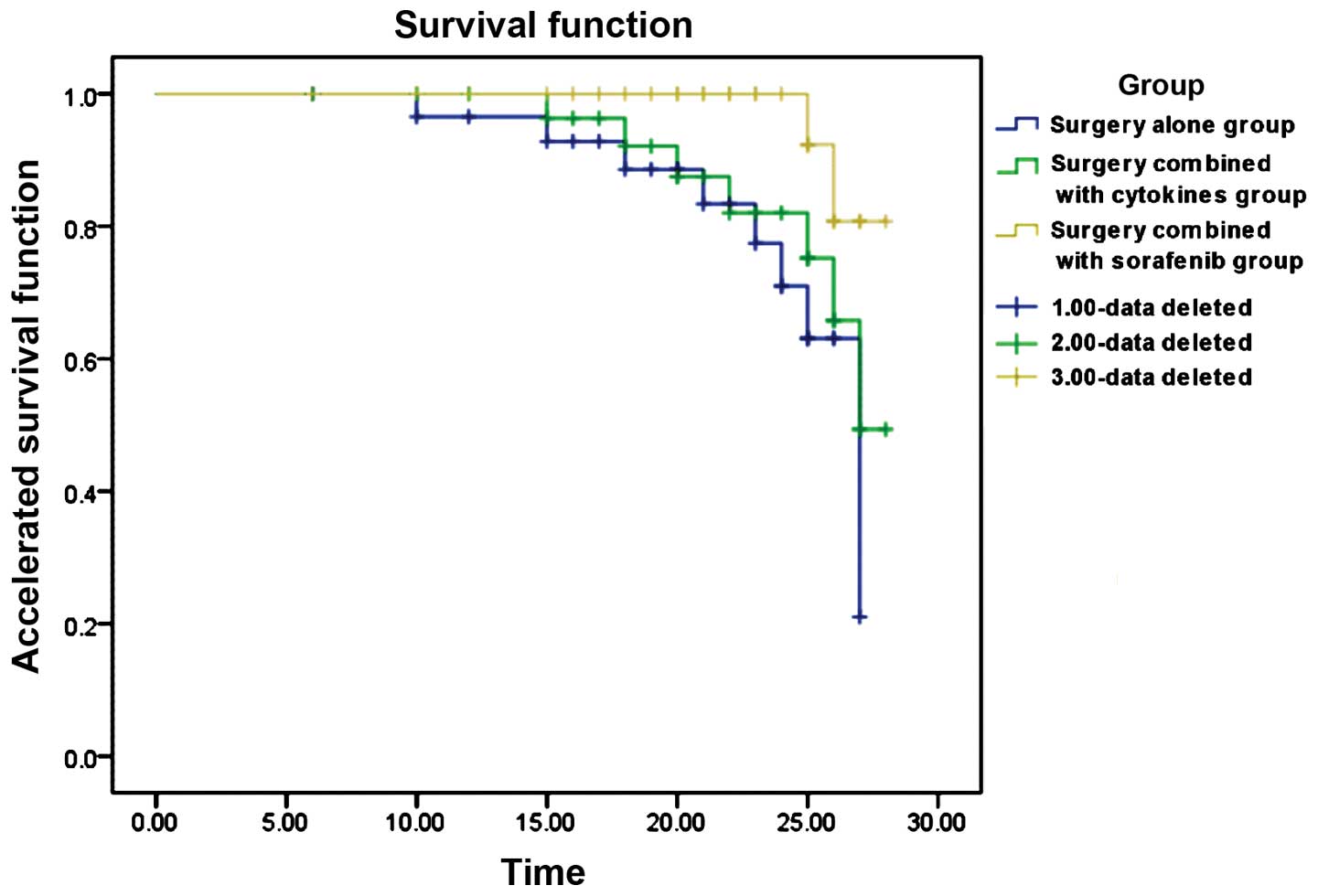|
1
|
Flaherty KT: Sorafenib: Delivering a
targeted drug to the right targets. Expert Rev Anticancer Ther.
7:617–626. 2007. View Article : Google Scholar : PubMed/NCBI
|
|
2
|
Ratain MJ, Eisen T, Stadler WM, Flaherty
KT, Kaye SB, Rosner GL, Gore M, Desai AA, Patnaik A, Xiong HQ, et
al: Phase II placebo-controlled randomized discontinuation trial of
sorafenib in patients with metastatic renal cell carcinoma. J Clin
Oncol. 24:2505–2512. 2006. View Article : Google Scholar : PubMed/NCBI
|
|
3
|
Hampton T: Cancer drug trials show modest
benefit: Drugs target liver, gastric, head and neck cancers. JAMA.
298:273–275. 2007. View Article : Google Scholar : PubMed/NCBI
|
|
4
|
Strumberg D: Preclinical and clinical
development of the oral multikinase inhibitor sorafenib in cancer
treatment. Drugs Today (Barc). 41:773–784. 2005. View Article : Google Scholar : PubMed/NCBI
|
|
5
|
Abou-Alfa GK, Schwartz L, Ricci S, Amadori
D, Santoro A, Figer A, De Greve J, Douillard JY, Lathia C, Schwartz
B, et al: Phase II study of sorafenib in patients with advanced
hepatocellular carcinoma. J Clin Oncol. 24:4293–4300. 2006.
View Article : Google Scholar : PubMed/NCBI
|
|
6
|
Wilhelm SM, Adnane L, Newell P, Villanueva
A, Llovet JM and Lynch M: Preclinical overview of sorafenib, a
multikinase inhibitor that targets both Raf and VEGF and PDGF
receptor tyrosine kinase signaling. Mol Cancer Ther. 7:3129–3140.
2008. View Article : Google Scholar : PubMed/NCBI
|
|
7
|
Wilhelm SM, Carter C, Tang L, Wilkie D,
McNabola A, Rong H, Chen C, Zhang X, Vincent P, McHugh M, et al:
BAY 43–9006 exhibits broad spectrum oral antitumor activity and
targets the RAF/MEK/ERK pathway and receptor tyrosine kinases
involved in tumor progression and angiogenesis. Cancer Res.
64:7099–7109. 2004. View Article : Google Scholar : PubMed/NCBI
|
|
8
|
Pagano M, Sierra NM, Panebianco M, Rossi
G, Gnoni R, Bisagni G and Boni C: Sorafenib efficacy in thymic
carcinomas seems not to require c-KIT or PDGFR-alpha mutations.
Anticancer Res. 34:5105–5110. 2014.PubMed/NCBI
|
|
9
|
Shi WH, Bian YH, Song XH and Wu JC:
Co-administration of Sorafenib with adriamycin inhibits cell
proliferation in hepatocellular carcinoma cells HepG2. Prog Mod
Biomed. 24:4845–3848. 2011.
|
|
10
|
Kondo T, Nakazawa H, Oya M, Kimura G,
Fujii Y, Hatano T, Kawata N, Kume H, Morita M, Nakajima K, et al:
Clinical efficacy and prognostic factors of tumor progression in
Japanese patients with advanced renal cell carcinoma treated with
sorafenib. Jpn J Clin Oncol. 45:274–280. 2015. View Article : Google Scholar : PubMed/NCBI
|
|
11
|
Mori Y, Cai K, Cheng Y, Wang S, Paun B,
Hamilton JP, Jin Z, Sato F, Berki AT, Kan T, et al: A genome-wide
search identifies epigenetic silencing of somatostatin,
tachykinin-1, and 5 other genes in colon cancer. Gastroenterology.
131:797–808. 2006. View Article : Google Scholar : PubMed/NCBI
|
|
12
|
Zhao J, Zhu Y, Zhang C, Wang X, He H, Wang
H, Wu Y, Zhou W and Shen Z: Sorafenib or sunitinib as postoperative
adjuvant therapy for Chinese patients with locally advanced clear
cell renal cell carcinoma at high risk for disease recurrence. Urol
Oncol. 31:1800–1805. 2013. View Article : Google Scholar : PubMed/NCBI
|
|
13
|
Wang ZY, Sun T and Ma M: The effects of
G250-DC-CIK cells combined with sorafenib on renal tumor cell. Chin
J Biochem Pharm. 32:225–228. 2011.
|
|
14
|
Gaudino M, Lau C, Cammertoni F, Vargiu V,
Gambardella I, Massetti M and Girardi LN: Surgical treatment of
renal cell carcinoma with cavoatrial involvement: A systematic
review of the literature. Ann Thorac Surg. 101:1213–1221. 2016.
View Article : Google Scholar : PubMed/NCBI
|
|
15
|
Antonelli A, Sodano M and Tardanico R:
Response to editorial comment to features, risk factors and
clinical outcome of ‘very late’ recurrences after surgery for
localized renal carcinoma: a retrospective evaluation of a cohort
with a minimum of 10 years of follow up. Int J Urol. 23:412016.
View Article : Google Scholar : PubMed/NCBI
|
|
16
|
Randall JM, Millard F and Kurzrock R:
Molecular aberrations, targeted therapy, and renal cell carcinoma:
Current state-of-the-art. Cancer Metastasis Rev. 33:1109–1124.
2014. View Article : Google Scholar : PubMed/NCBI
|
|
17
|
Miyake H, Muramaki M, Imai S, Harada KI
and Fujisawa M: Changes in renal function of patients with
metastatic renal cell carcinoma during treatment with
molecular-targeted agents. Target Oncol. 27:45–47. 2015.
|
|
18
|
Choi KH, Yu YD, Kang MH and Park DS:
Sorafenib treatment for recurrent stage T1 bilateral renal cell
carcinoma in patients with Von Hippel-Lindau disease: A case report
and literature review. Can Urol Assoc J. 9:E651–E653. 2015.
View Article : Google Scholar : PubMed/NCBI
|
|
19
|
Lin CH, Yuan HJ, Wang K, Wu JT, Liu QZ, Yu
SQ, Men CP, Gao ZL and Wang J: Initial experience of sorafenib
neoadjuvant therapy combined with retroperitoneoscopy in treating
T2 large renal carcinoma. BioMed Res Int. 2015:6095492015.
View Article : Google Scholar : PubMed/NCBI
|
|
20
|
Eriksen KW, Søndergaard H, Woetmann A,
Krejsgaard T, Skak K, Geisler C, Wasik MA and Odum N: The
combination of IL-21 and IFN-alpha boosts STAT3 activation,
cytotoxicity and experimental tumor therapy. Mol Immunol.
46:812–820. 2009. View Article : Google Scholar : PubMed/NCBI
|















